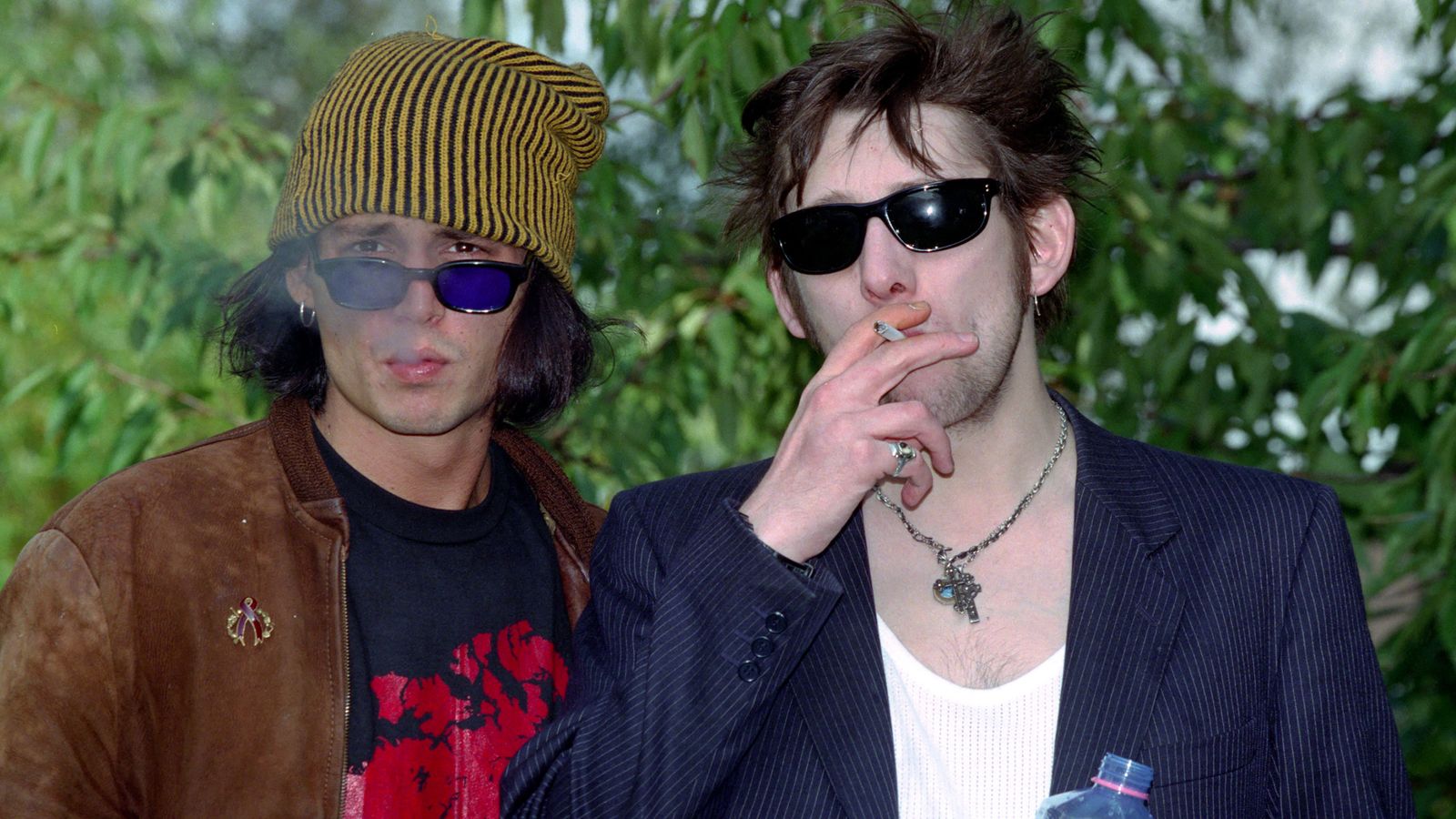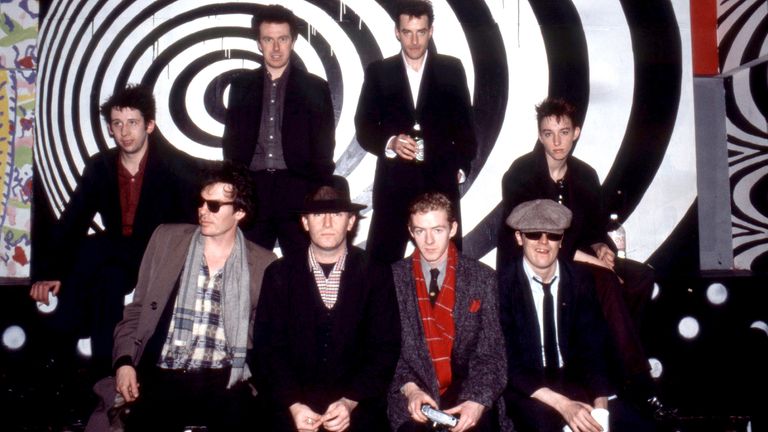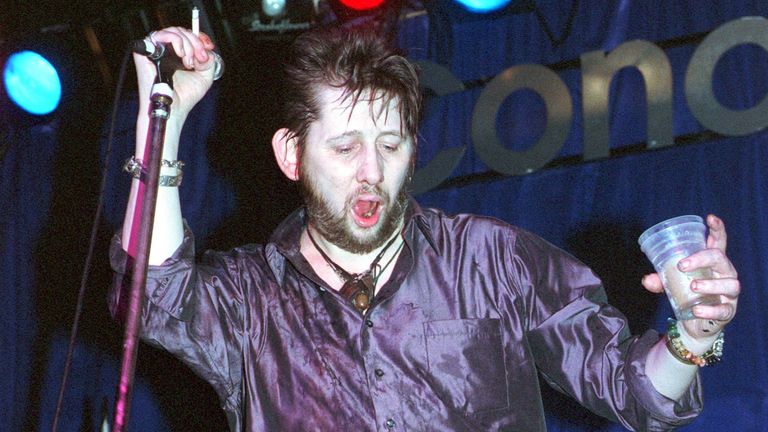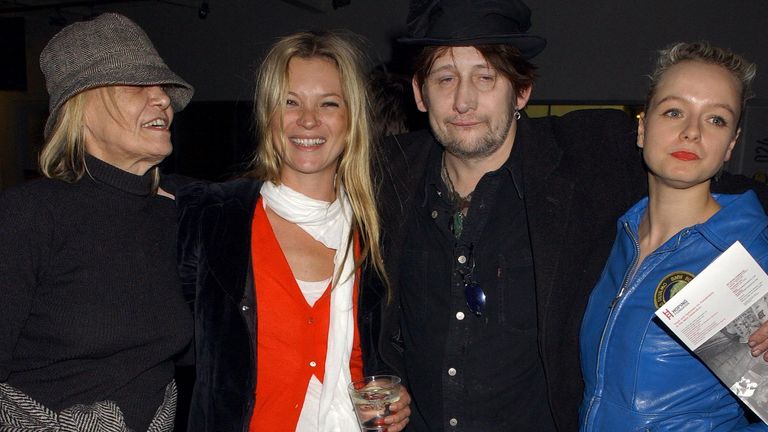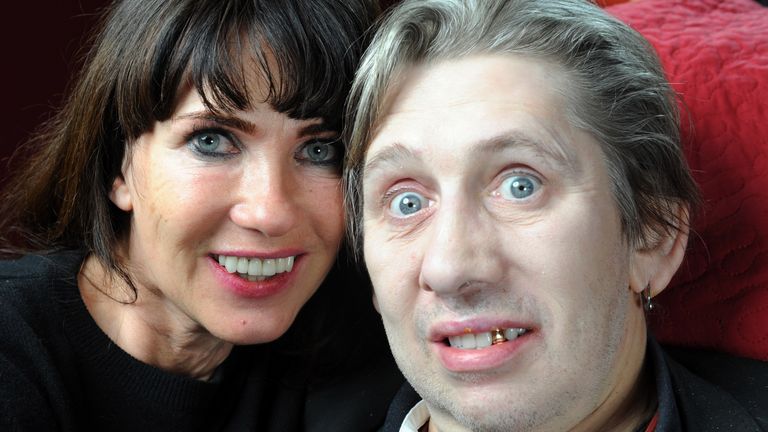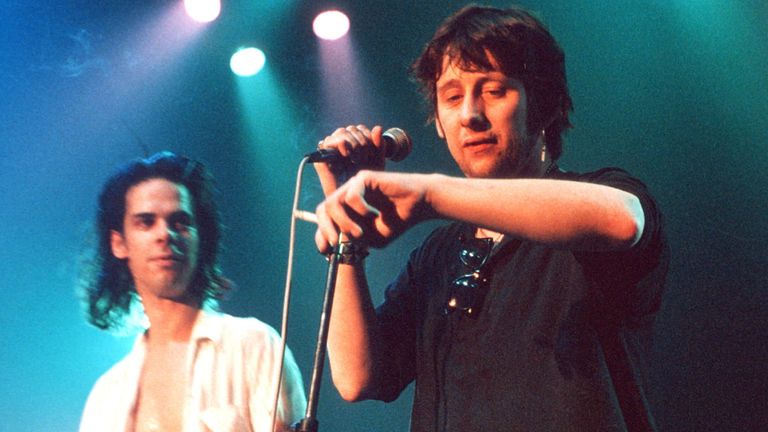According to Shane MacGowan, the seeds of Fairytale Of New York were sown when Elvis Costello bet him he couldn’t write a yuletide hit without selling out.
Appropriately for a song that centres around a quarrel there are differing accounts of the origins, but MacGowan – although on occasion something of an unreliable narrator – always maintained this version.
Joining the likes of Slade, Band Aid, Bing Crosby and Wham! might have seemed an unlikely feat but The Pogues frontman and banjo player Jem Finer rose to the challenge, creating an antithesis to festive cheer in their bitter, drunken tale of hard times and broken dreams.
The huge success of the duet with the late Kirsty MacColl eventually played a part in the band’s downfall, and MacGowan would say he grew sick of hearing it and talking about it in later years.
But in Fairytale, he created the anti-Christmas song that became, to many, the ultimate Christmas song – a legacy meaning that now after his death, he will forever be remembered at that time of year.
Born in Kent to Irish parents on Christmas Day in 1957, perhaps it was always meant to be.
After finding success with Celtic punk band The Pogues, MacGowan would become almost as famous for his excessive drinking and drug-taking – and the toll it took on his already irregular teeth – as he was for his music. But it was in his childhood years, at the young age of about four or five, that he said he first developed a taste for alcohol.
His reputation belied his talents and intellect. The singer was a gifted storyteller from a young age, winning a Daily Mirror literary prize when he was 13, and a scholarship to the posh Westminster School for his essays. “I didn’t last there very long,” he said in a 2013 interview. “I got nicked for smoking a joint and was kicked out.”
Shane O’Hooligan, The Nips, and Pogue Mahone
It was in London that he discovered punk and rechristened himself Shane O’Hooligan, joining his first band Nipple Erectors – which became The Nips in 1976 – and supporting the likes of The Clash and The Jam.
He also played guitar with The Millwall Chainsaws, the prototype for the band that would become Pogue Mahone (Irish slang for “kiss my arse”) and eventually The Pogues.
The band’s debut album, Red Roses For Me, came out in 1984, followed by Rum Sodomy & the Lash the following year. Their singles included Dark Streets Of London, A Pair Of Brown Eyes, Sally MacLennane, Dirty Old Town and The Irish Rover.
Fairytale Of New York was released at the end of November 1987. Like many Christmas songs that came to be festive classics – such as Wham!’s Last Christmas and Mariah Carey’s All I Want For Christmas Is You – it was kept off the number one spot, with the accolade that year going to the Pet Shop Boys’ cover of Always On My Mind.
But Fairytale has endured; in December 2022, the song was certified quintuple platinum in the UK for three million combined sales, and it is often voted the nation’s favourite festive single.
As The Pogues gained commercial success, fame, touring and the chaotic lifestyle took a toll and MacGowan was eventually sacked from the band for unprofessional behaviour in 1991.
He went on to form Shane MacGowan And The Popes, before reforming with The Pogues for a sell-out tour in 2001.
Together, the band released five albums between 1984 and 1990, while MacGowan released two with The Popes in 1994 and 1997.
Awards, books, and ‘spit, snot and tears’
As a solo artist, he recorded a version of Louis Armstrong’s Wonderful World with Nick Cave, and in 1996 he became an unlikely voice for Nike when his version of My Way was used in an advertising campaign.
The following year he appeared alongside Lou Reed and stars such as David Bowie, Elton John, Bono, Heather Small and Tom Jones on Reed’s number one song Perfect Day for Children In Need. He also performed with acts including the late Sinead O’Connor, The Jesus And Mary Chain, and his good friend Johnny Depp throughout his career.
Read more:
Sinead O’Connor: A rise to unwanted stardom
Tributes for The Pogues bassist Darryl Hunt
While the singer hadn’t released his own new music for years, in 2018 he was honoured with the Ivor Novello Inspiration Award for songwriting, and in 2021 he recorded songs with Irish band Cronin – described as “raw, vital, exactly what you want from MacGowan” by music journalist Will Hodgkinson in The Times.
The following year, he published The Eternal Buzz And The Crock Of Gold, a collection of his drawings, lyrics, essays and photographs, described as the “spit, snot and tears” of his art.
MacGowan married his long-term partner, journalist Victoria Mary Clarke, at a ceremony in Copenhagen in 2018, with Depp playing guitar at their wedding.
Writing for the Irish Independent ahead of their nuptials, about the first time she met him at the age of 16, Clarke said she was “awe-struck”, before detailing a complicated relationship that “makes the Fairytale Of New York couple from Shane’s Christmas song seem tame and orderly”.
New teeth – and pranks at Bono’s house
For the ceremony, he was able to deliver a perfect smile, having received a full set of pristine dentures – plus one gold tooth – a few years earlier. This was documented in a Christmas special, Shane MacGowan: A Wreck Reborn in 2015, with the feat to restore his gnashers described as the “Everest of dentistry” by the surgeon; the “wreck” in the title was apparently the singer’s own idea.
After the story of his teeth came the story of his life and career, as told in the 2021 documentary Crock Of Gold: A Few Rounds With Shane MacGowan. “The lyrics are all about fighting, drinking, dying… you know, the things that everybody does,” he said of his music.
Read more:
‘I dreaded getting my teeth fixed’
Fairytale Of New York to be edited for Radio 1
He gave interviews to a few publications at the time, but clearly wasn’t a huge fan of answering questions about himself, especially the song he is most known for.
To the Guardian, when asked after a few silences and curt answers if there was any subject he did want to talk about, he replied: “Not really, no.”
On Fairytale, he simply said: “It p****s me off when people always talk about it.”
But he could also be outrageously indiscreet – such as when talking about the time he lived in a house owned by U2 frontman Bono on the Dublin coast, next to a railway line. “Bono put in a glass roof and wall, ” he told The Times. “I used to wave my willy at the train as it passed and hope that they thought it was Bono’s.”
How Fairytale became ‘boring’ – and the controversy ‘ridiculous’
Addressing Fairytale, he said it became “boring” once the song became such a hit. “You’re walking out on stage and they’re applauding like mad before you’ve done anything, yeah? It gets frightening.”
But in an interview with The Sun a few years earlier, his stance was softer when he hailed the track as “a great performance”, albeit of “the nastiest Christmas single ever”.
To Vice, he described Christmas as “gross” and said he was “bored” of hearing the song, before conceding: “It’s nice to hear Kirsty sing… It’s a great record – I can be objective enough to hear that it’s a great record. We all know that we made a great record. We were a great band.”
Fairytale Of New York appealed because no matter who you were, where you were from, most could relate to it in some way. “I could have been someone,” MacGowan famously snarls at MacColl. “Well, so could anyone,” she retorts; four words that sum up perfectly the loss of childhood dreams felt by us all at some stage.
Of the controversy that came to surround the song in later years, with derogatory terms for gender and sexuality edited by some radio stations, MacGowan explained that the language fitted the characters, and that they were not supposed to be “nice” or “wholesome”. In interviews, he described the criticism as “ridiculous”.
In his later years, suffering from periods of ill health, the singer communicated with fans through social media, even joining TikTok in 2022. He and Clarke shared updates and information about his book, as well as pictures with celebrities including Kate Moss and Bruce Springsteen. The singer, it seems, didn’t mind the spotlight so much when he did things his way.
Of Creating the Crock Of Gold film about MacGowan, director Julien Temple would say afterwards it was like David Attenborough tracking down an elusive snow leopard.
But the filmmaker knew well before he started the project that he was dealing with a difficult character. He was a one-off, Temple said. “I guess that’s what makes him great.”
